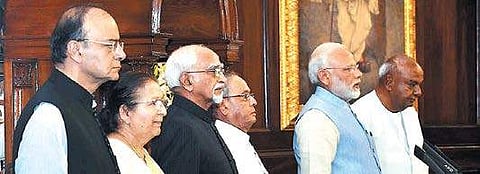Grey areas remain in new tax regime
NEW DELHI: The government, corporate and consumers will change the way taxes are paid and collected in India, which will also alter the way India governs, trades and transacts from Saturday, say analysts.
The challenges and benefits of GST are as good as high-risk high-returns. “It’s just a matter of time that the air of confusion will clear around GST and India with its resilience will embrace GST,” said Ansh Bhargava, head — growth & Alliances, Taxmann.com.
A few sectors like real estate have a reason to feel discontented, as grey areas remain. “The authorities have not agreed for centralised registration and this will increase the compliance cost of the developers. There will be a considerable increase in the number of returns filed,” says Ashish Sarin, CEO, Alpha Corp.
Further, valuation of land in the payment of taxes is a problem area and abetment of the land value in the valuation of taxable amount is an issue that remains unresolved. “One nation one tax will have a positive impact and bring more transparency in the tax system and its benefits must pass on to consumers,” said R K Arora, chairman, Supertech.
According to officials in the GST Council, there are many sectors other than real estate that have some unresolved issues. The fitment committee is the body that will hear them all; so there should be no concern,” said a senior finance ministry official in the GST Secretariat.
Consumers will probably have to fight more fiercely for their rights than ever, during the initial period of GST roll out. “Categories where we have a reduction in taxes, commensurate benefits will be passed on to the consumers,” says Suresh Narayanan, CMD, Nestle India.
While companies feel taxes are not reduced, the consumer will have to share the burden fully or partially. This is an issue the GST Council is expected to take a view soon. Till then, however, the end consumer could be fleeced in the name of GST post July 1, as against the mega GST sales in the run-up to the rollout.

